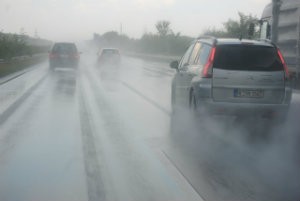
Weather can be very unpredictable, especially in Missouri. One day, it might be sunny, warm, and dry. The next, it might be rainy, foggy, and cold. Our summers are hot and humid, while our winters can be bitterly cold. Large commercial truck drivers must be aware of the weather conditions they are driving in, keeping public safety in mind.
Truck drivers, actually all drivers, are required to drive responsibly in all types of weather. There is no exception to this based on the conditions of the road or weather.
When determining who is at fault, weather and road conditions will be noted; however, weather alone does not prevent a driver from being found liable.
CONTACT US TODAY FOR A FREE REVIEW OF YOUR CASE
Negligent behavior might include things such as:
Common causes of weather-related trucking accidents include:
Large commercial truck drivers must be aware of the weather conditions they are driving in, keeping public safety in mind.
Adverse Weather Statistics
On average, there are over 5,891,000 vehicle crashes each year, and approximately 21% of these are weather-related. That is nearly 1,235,000 crashes, with nearly 5,000 people killed and over 418,000 injured.
Table: Weather Impacts on Roads, Traffic and Operational Decisions, Federal Highway Administration
Have questions? Contact us at (877) 284-6600.
Weather-related crashes are defined as those that occur in adverse weather such as rain, sleet, snow, fog, severe crosswinds or blowing snow/sand/debris, or on slick pavement.
Precipitation
The majority of weather-related crashes happen on wet pavement (70%) and during rainfall (46%).

Rain affects a driver’s ability to see the road and can cause vehicles to hydroplane.
Rain, really all types of precipitation, affects a driver’s ability to see and can create the risk of hydroplaning. A hydroplaning large commercial truck weighing 20-30 times that of a passenger car creates an extreme danger to other vehicles on the road.
Rain, snow, and ice make road surfaces slippery. Slippery surfaces affect a truck’s traction. The lack of traction can make it harder to slow down and brake and even make steering/controlling the truck much more difficult, especially for those traveling at a high rate of speed.
Black ice, often found on bridges and overpasses, creates even more danger on the road for truck drivers.
Fog
Fog is another weather condition that can significantly reduce visibility. It reduces a driver’s ability to see long distances thereby impacting the ability to judge the distances of cars in front or behind. An inability to see down the road can reduce a driver’s response time and cause drivers to veer out of their lane.
Wind Speed
Wind causes trailers to become unsteady on the road. The top-heavy structure makes a truck’s chance of tipping over on the road more likely during high winds.
Trucks are more susceptible to crosswinds because of how large the sail area is (this is the exposed trailer sides that catch the wind). Heavy crosswinds can become powerful enough to blow a truck out of one lane and into another or completely off the road.
Subpart B: Driving of Commercial Motor Vehicles §392.14 Hazardous conditions; extreme caution.
Extreme caution in the operation of a commercial motor vehicle shall be exercised when hazardous conditions, such as those caused by snow, ice, sleet, fog, mist, rain, dust, or smoke, adversely affect visibility or traction. Speed shall be reduced when such conditions exist. If conditions become sufficiently dangerous, the operation of the commercial motor vehicle shall be discontinued and shall not be resumed until the commercial motor vehicle can be safely operated. Whenever compliance with the foregoing provisions of this rule increases the hazard to passengers, the commercial motor vehicle may be operated to the nearest point at which the safety of passengers is assured.
Under Section 304.012 of Missouri’s Revised Statutes, “every person operating a motor vehicle on the roads and highways of this state shall drive the vehicle in a careful and prudent manner and at a rate of speed so as not to endanger the property of another or the life or limb of any person and shall exercise the highest degree of care.”
Section 304.012 establishes the standard of care drivers must exercise to avoid negligence liability in Missouri. Significantly, the statute does not impose a specific speed limit on drivers. This provision was intentionally done knowing that weather conditions can impact what constitutes safe driving speeds and maneuvers.
Have you been seriously injured in a truck accident? Call Nash & Franciskato at (877) 284-6600. We have a successful track record of helping accident victims collect the compensation they deserve.
In the Kansas City area and across Missouri, the Nash & Franciskato Law Firm will fight for your rights. Contact our legal team today at (877) 284-6600. One of our experienced staff will speak with you personally and will provide you with a free, no-obligation case evaluation.
CONTACT US FOR A FREE REVIEW OF YOUR CASE
If you would like to receive news and blog updates regularly, sign up to receive our email newsletter. Your email address will only be used to send you our newsletter and respond to inquiries.
Find related blog articles: Trucking Accidents and Automobile Accidents
Past results afford no guarantee of future results and each case is different and is judged on its own merits. The choice of a lawyer is an important decision and should not be based solely upon advertisements.
Editor’s Note: This post was originally published on January 19, 2021. It was reviewed on November 9, 2022, and updated for content and accuracy, and again on December 23, 2024.